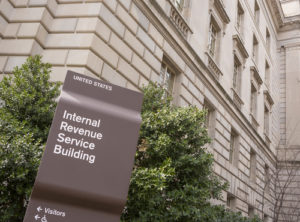
The U.S. House of Representatives on April 9 approved the Taxpayer First Act of 2019, a bipartisan bill co-authored by U.S. Rep. Mike Kelly (R-PA) that contains reform provisions offered by U.S. Reps. Brad Wenstrup (R-OH) and Doug Collins (R-GA).
“Today, Republicans and Democrats set aside their differences and passed legislation together that will greatly benefit U.S. taxpayers,” said Rep. Kelly, the top Republican on the U.S. House Ways and Means Oversight Subcommittee, following Tuesday’s passage of H.R. 1957.
Rep. Kelly on March 28 introduced H.R. 1957 with U.S. Rep. John Lewis (D-GA) to modify requirements for the Internal Revenue Service (IRS) regarding its organizational structure, customer service, enforcement procedures, management of information technology, and use of electronic systems, according to the congressional record summary.
The U.S. Senate received the bill for consideration on Wednesday.
“The IRS is one of few federal agencies that Americans, whether they like it or not, will have a constant relationship with throughout their lives,” Rep. Kelly said. “The bill we passed today will make sure that relationship is built on trust rather than fear and that taxpayers’ rights are safeguarded when they interact with the agency.”
To protect the integrity of our voluntary tax compliance system, the IRS should be a resource for Americans, not their adversary, said Kelly.
If enacted, the measure would require the IRS to alter several of its current practices to focus on service and H.R. 1957 would make the IRS more accountable to Congress and the public, according to the lawmaker.
Among numerous provisions, the House-approved measure includes the bipartisan Volunteer Income Tax Assistance (VITA) Permanence Act of 2019, H.R. 1875, which Rep. Wenstrup introduced on March 26 with U.S. Rep. Danny Davis (D-IL) to facilitate the nationwide availability of volunteer income tax assistance for low-income and underserved populations, according to the text of the bill.
H.R. 1875 also would make permanent the federal Volunteer Income Tax Assistance Matching Grant Program so that VITA sites would continue to provide tax-filing services, according to Rep. Wenstrup, whose office said that VITA centers offer free tax help to people who earn about $55,000 or less, persons with disabilities and limited English-speaking taxpayers by IRS-certified volunteers.
“VITA centers are an important resource for lower income families across Ohio,” said Rep. Wenstrup on Tuesday. “VITA centers help families and individuals file their taxes correctly and protect them from scammers.”
The VITA matching grant program, he said, supports VITA centers by providing funds to pay for materials, equipment and educational services.
“Our bill would make this program permanent, so VITA centers can continue to provide this tax assistance and filing resources to Ohioans,” Rep. Wenstrup said, adding that of the 3,700 VITA sites nationwide, there are 19 sites in his Ohio district that prepared 5,554 returns last year.
Rep. Davis noted that the duo’s included bill “provides high-quality tax help for free” and he called it “a smart federal investment that helps people and communities, doubling outreach through public-private partnerships.”
The larger H.R. 1957 also included the Restraining Excessive Seizure of Property through the Exploitation of Civil Asset Forfeiture Tools Act, H.R. 1219, also known as the Clyde-Hirsch-Sowers RESPECT Act, introduced on Feb. 14 by Reps. Collins, Kelly, and U.S. Rep. John Lewis (D-GA).
Rep. Collins’ H.R. 1219 would revise the authority and procedures that the IRS uses to seize property that has been structured to avoid Bank Secrecy Act (BSA) reporting requirements, according to the congressional record summary. Under the bill, the IRS could only seize property it suspected was structured to avoid BSA reporting requirements if the property was derived from an illegal source or the funds were structured to conceal the violation of a criminal law or regulation to evade BSA reporting requirements.
“By reforming federal forfeiture laws to prevent civil asset forfeiture abuse, the RESPECT Act will protect hard-working individuals from IRS overreach and ensure all American citizens are afforded the due process guaranteed by our Constitution,” Rep. Collins said earlier this week.
The congressman thanked Reps. Kelly and Lewis “for their ongoing commitment to passing this legislation and protecting innocent Americans from IRS abuse.”
The overall Taxpayer First Act also includes numerous other provisions, including those that would establish the IRS Independent Office of Appeals to resolve federal tax controversies without litigation; continue the IRS Free File Program; exempt certain low-income taxpayers from payments required to submit an offer-in-compromise; require the IRS commissioner to appoint a chief information officer; and would authorize streamlined critical pay authority for certain IRS information technology positions, among many others.



